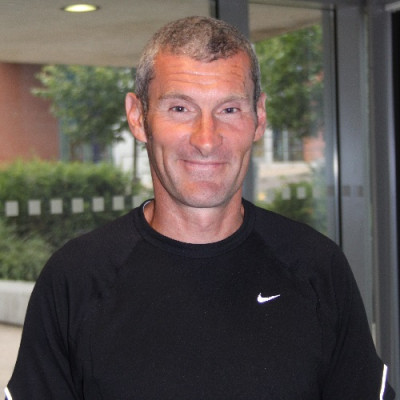Meet Dr Steve Meadows, Programme Director for BSc (Hons) Sport and Exercise for Health and undergraduate Admissions Officer for the School of Sport and Exercise Sciences.
As well as working in the health and fitness industry for many years, Dr Steve Meadows holds an undergraduate degree in Sport Science, Health and Health Promotion, an MSc in Sport and Exercise Science and a PhD which investigated METs expenditure of cardiac patients during exercise – which is another way of looking at their oxygen uptake (or aerobic fitness). Subsequent published work in this area has critiqued the use of standard MET values for a clinical population.
As a qualified and practising BACPR Phase IV exercise instructor, Steve has worked in cardiac rehabilitation for 18 years, so brings a rich experience to his teaching sessions. He has also set up a community-based stroke rehabilitation group and a Parkinson’s exercise class. These sessions have provided valuable work experience opportunities for students to get involved, as he is keen for them to develop not just their academic and research skills, but also to broaden their horizons on the opportunities available to sport and exercise graduates working within the NHS or other health-promoting agencies.
He is an advocate of using exercise as medicine for prevention and management of chronic disease conditions, and these areas are his teaching specialisms. Dr Meadows’ teaching focuses on human anatomy and physiology (1st year module), exercise for special populations (2nd year module) and exercise prescription, referral and rehabilitation (3rd year module).
There are many unexplored issues related to the field of clinical exercise physiology and psychology. This is made more interesting and complex when most people experience health problems later in life. Getting and keeping people more active is critical to maintaining and improving health throughout the life-course. Strategies that work in a real-life setting is a focus of his research interest, along with the evaluation of intervention outcomes. His passion is to see research undertaken in applied settings, providing a ‘living laboratory’ for the researcher and students.
Dr Meadow’s current research interests relate to exercise interventions in clinical population groups, but also the broader factors that impact health and people’s ability to exercise and preserve or improve their health and functional capacity. His research work reflects his practical engagement with various clinical exercise rehabilitation groups. His most recent research project is an investigation into brain-derived neurotrophic factor (BDNF) and the effect of exercise on people with Parkinson’s Disease.
He ascribes to ‘practising what he preaches’ and prefers his bike, skateboard or scooter to driving. In his spare time, he enjoys Parkrun, mountain sports, kayaking, cycling, reading, live music gigs and spending time walking his cocker spaniel dog, or working on his allotment.

